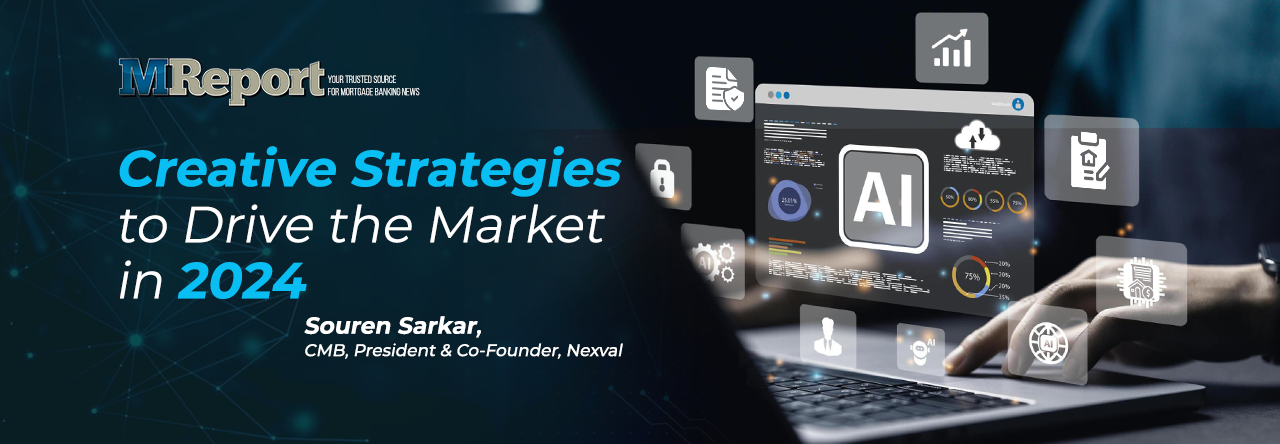
Souren Sarkar, CMB, serves as President and Co-Founder of Nexval, a technology company specializing in mortgage automation processes and IT infrastructure upgrades, located in Miami, Florida. Sarkar has more than 25 years of experience as a technology leader in the mortgage and banking arena and is an expert at improving the performance and scalability of service-driven businesses using workflow automation.
MortgagePoint recently had a chance to chat with Sarkar about the proliferation of tech in the mortgage space, and what lies ahead as the industry continues to embrace these advancements moving forward.
What’s in store for the housing market as we enter 2024? What are some of the headwinds that the industry will be faced with in the coming year?
Souren Sarkar: There is a huge need to build both new homes and rentable multifamily units to meet consumer demand for housing, yet high interest rates combined with a reduction of inventory continue to push up housing costs. It doesn’t seem likely interest rates will go down significantly soon, either, so affordability will continue to be a big challenge for most first-time homebuyers. While employment is near an all-time high, income levels have not risen very dramatically.
Given all these pressures, I expect to see more creative strategies to reduce the entry point for homebuyers. Already, many homebuilders are buying down interest rates on behalf of their borrowers to make the monthly mortgage payment more affordable. I expect these creative buydown strategies are something we’ll see increasingly next year.
Overall, I expect a year of turmoil. By late 2024 and early 2025, during and after election season, we may see more politically driven policies to increase housing affordability and reduce rates, and bring everything back to normal, but it may take another couple of years for that to happen.
Are there any trends in technology you are witnessing being employed by the industry to streamline operations?
Souren Sarkar: Obviously, the big topic right now is artificial intelligence (AI) and generative AI, and how lenders and servicers are using these tools to reduce costs. Many companies are looking across their operations to see what areas they can get both immediate and longer-term wins with AI and generative AI.
For example, one of the most expensive areas of the mortgage business is customer service, both in origination and servicing. Using natural language processing, AI can understand customer requests and respond with the correct information in just seconds. So, when it comes to leveraging AI, these areas are typically looked at first because they are where you can get the maximum savings.
Another growing trend involves using AI to help reduce the increasing costs of regulatory compliance and risk management. AI and machine learning can play a role in rules-based decision-making tasks, such as detecting fraud and scoring loans for risk, by using algorithms to process vast quantities of data at speeds humans are incapable of.
Another major emphasis is IT security. From a risk management perspective, this has become a key headache for most mortgage banks, particularly given the number of recent high-profile data breaches and attacks on several large industry players. Besides damaging their reputation, security breaches have opened up companies to class action lawsuits and other financial losses. Even in this market, a lot of companies are opening up their budgets for stronger security measures, because they realize that being penny-wise and pound-foolish with IT security is no longer going to fly.
As AI and machine learning (ML) continue to advance and evolve as everyday tools for the industry, will we ever be able to rely 100% on these tools or will the human touch always be a necessary part of the origination process?
Souren Sarkar: AI and machine learning will not change our industry overnight—there will be a gradual, progressive transformation. But what these technologies will do is put a lot of pressure on our industry’s dependence on legacy systems and companies that have centralized their data and system monopolies. If these legacy providers cannot incorporate AI and machine learning into their processes, their customers will find other solutions.
Everyone feels like there will always be a need for human interaction, although I feel that will be partially correct. If the human touch can be replicated and fine-tuned, and then that available in an automated or AI tool, it is only a matter of time before the early adopters of technology—, millennials and Gen Z—will prefer talking to the AI rather than a human operator. Older consumers will prefer human operators for a while. However given how quickly older consumers have adapted to social media, eventually, they too may prefer AI. I don’t think human interaction will be eliminated, but there will be an increasing effort in the industry to reduce it as much as possible. It’s one of the best opportunities the industry has to reduce costs and increase margins. After using all kinds of methods to reduce costs and improve efficiency, from offshoring to using automation, AI and machine learning tools may be the saviours they truly need.
1101 Brickell Avenue
South Tower, 8th Floor
Miami, FL 33131
P: +1-786-206-9056
F: + 1-888-462-4923
E: info@nexval.ai
W: www.nexval.ai
I’m excited to guide industry colleagues through the current transformation. My goal is to offer valuable insights that benefit you and foster fruitful collaborations and partnerships.
Let’s embark on this journey together and unlock new opportunities in our industry! – Souren Sarkar
1101 Brickell Avenue
South Tower, 8th Floor
Miami, FL 33131
P: +1-786-206-9056
F: + 1-888-462-4923
E: info@nexval.ai
W: www.nexval.ai
I’m excited to guide industry colleagues through the current transformation. My goal is to offer valuable insights that benefit you and foster fruitful collaborations and partnerships.
Let’s embark on this journey together and unlock new opportunities in our industry! – Souren Sarkar
© 2025 Nexval | Terms
© 2025 Nexval | Privacy Policy | Terms